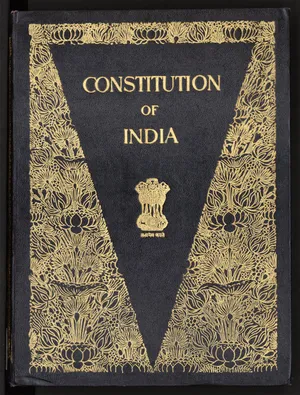10:00AM - 06:00PM
Our Working Hours

Text of the Preamble
The Preamble reads:
"WE, THE PEOPLE OF INDIA, having solemnly resolved to constitute India into a SOVEREIGN SOCIALIST SECULAR DEMOCRATIC REPUBLIC and to secure to all its citizens:
JUSTICE, social, economic and political;
LIBERTY of thought, expression, belief, faith and worship;
EQUALITY of status and of opportunity;
and to promote among them all FRATERNITY assuring the dignity of the individual and the unity and integrity of the Nation;
IN OUR CONSTITUENT ASSEMBLY this twenty-sixth day of November, 1949, do HEREBY ADOPT, ENACT AND GIVE TO OURSELVES THIS CONSTITUTION."
Key Elements of the Preamble
Source of Authority: The phrase "We, the People of India" signifies that the Constitution derives its authority from the citizens of India, emphasizing the democratic foundation of the nation.
Nature of the Indian State:
Sovereign: India is independent, free from external control, and has the authority to govern itself.
Socialist: Added by the 42nd Amendment in 1976, it reflects the commitment to reducing socio-economic inequalities and promoting welfare.
Secular: Also added in 1976, it ensures the state maintains neutrality and respects all religions equally.
Democratic: The government is elected by the people, ensuring their participation in governance.
Republic: India has an elected head of state (the President), not a hereditary monarch.
Objectives of the Constitution:
Justice: Ensures social, economic, and political fairness for all citizens.
Liberty: Guarantees freedoms of thought, expression, belief, faith, and worship.
Equality: Promotes equal status and opportunities, eliminating discrimination.
Fraternity: Encourages brotherhood, fostering dignity and national unity.
Date of Adoption: The Preamble was adopted on November 26, 1949, by the Constituent Assembly, marking the formal completion of the Constitution.
Significance of the Preamble
The Preamble is not merely an introductory statement but a reflection of the core values of the Indian Constitution. It serves multiple purposes:
Guiding Framework: Courts, especially the Supreme Court of India, refer to the Preamble to interpret constitutional provisions, as seen in landmark cases like Kesavananda Bharati v. State of Kerala (1973), where it was declared part of the Constitution’s basic structure.
Inspiration: It inspires citizens and lawmakers to uphold the principles of justice, liberty, equality, and fraternity.
Identity of the Nation: It defines India’s commitment to democracy, secularism, and socialism, making it a unique identity statement.
Amendments to the Preamble
The Preamble was amended once through the 42nd Constitutional Amendment Act of 1976, which added the words "Socialist," "Secular," and "Integrity" to strengthen the commitment to socio-economic welfare, religious neutrality, and national unity.
Conclusion
The Preamble of the Indian Constitution is a concise yet profound declaration of India’s vision as a nation. It embodies the dreams of a diverse and dynamic country striving for justice, equality, and unity. As the cornerstone of the Constitution, it continues to guide India’s democratic journey, reminding citizens and leaders alike of their shared commitment to building an inclusive and equitable society.